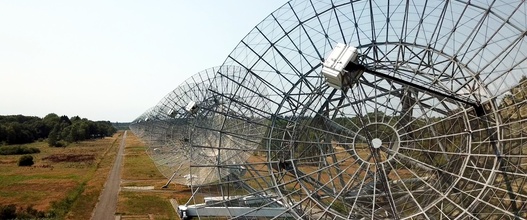Zes sterrenstelsels ontdekt met amper donkere materie
Een internationaal team sterrenkundigen onder leiding van Pavel Mancera Piña (Rijksuniversiteit Groningen en ASTRON) heeft zes lichtzwakke dwergsterrenstelsels ontdekt die amper donkere materie bevatten. Dat is bijzonder, want van de meeste lichtzwakke dwergsterrenstelsels wordt juist verwacht dat ze alleen door een grote hoeveelheid donkere materie bij elkaar gehouden kunnen worden. De onderzoekers publiceren hun bevindingen binnenkort in The Astrophysical Journal Letters .

De sterrenkundigen gebruikten voor hun onderzoek de schotels van de Nederlandse Westerbork Synthese Radio Telescoop en die van de Amerikaanse Very Large Array. Ze keken naar zes lichtzwakke dwergsterrenstelsels op 240 miljoen lichtjaar tot 320 miljoen lichtjaar van ons vandaan. Dit soort sterrenstelsels was nog niet zo goed bestudeerd, omdat ze weinig licht geven.
De naam dwergsterrenstelsel slaat bij deze groep op de lichtzwakte en niet op hun grootte. Ze zijn namelijk net zo groot als onze eigen Melkweg, maar bevatten veel minder sterren. Het heersende idee is dat zulke grote dwergstelsels alleen kunnen bestaan als ze door donkere materie bij elkaar worden gehouden.
Na bestudering van de dwergstelsels bleek tot verrassing van de onderzoekers dat de zwakke dwergstelsels en hun omgeving geen donkere materie lijken te bevatten. Volgens de huidige theorieën zouden deze zes stelsels dan ook niet mogen bestaan.
De onderzoekers poneren in hun wetenschappelijke publicatie enkele verklaringen voor het uitblijven van donkere materie, maar eigenlijk, zo zeggen ze zelf, hebben ze er nog geen goede verklaring voor.
Eerder waren door een andere onderzoeksgroep ook twee sterrenstelsels ontdekt met weinig donkere materie. Van de zes nieuwe stelsels zijn veel meer details bekend.
